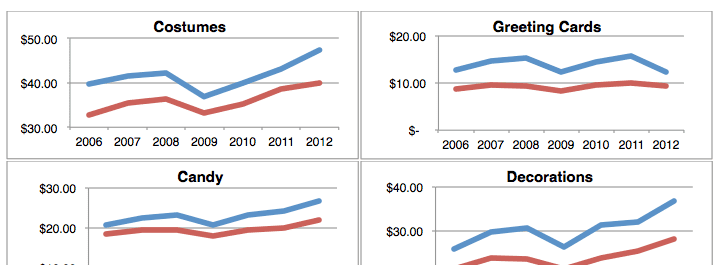
Halloween Economics: Who Spends Money on What?
Read a summary using the INOMICS AI tool
Halloween is a highly commercialized holiday in the US, with people of all ages celebrating and spending. Expected Halloween spending of US consumers in 2012 almost equals government expenditures of Kenya. According to surveys conducted annually by the National Retail Federation, in last five years total spending on Halloween in the US grew from $4.96 billion in 2006 to an expected $8 billion in 2012. After a significant drop in spending in 2009, consumers managed to bring it back up to the level of a previous year in 2010.
Halloween is a highly commercialized holiday in the US, with people of all ages celebrating and spending. Expected Halloween spending of US consumers in 2012 almost equals government expenditures of Kenya. According to surveys conducted annually by the National Retail Federation, in last five years total spending on Halloween in the US grew from $4.96 billion in 2006 to an expected $8 billion in 2012. After a significant drop in spending in 2009, consumers managed to bring it back up to the level of a previous year in 2010.
The top expenditure in the 2012 Halloween budget is expected to be costumes ($2.87 billion), including costumes for adults ($1.4 billion), children ($ 1.1 billion) and pets ($37 million). Decorations and candy are the second and third most popular items ($2.36 billion and $2.33 billion accordingly). Interestingly, men are ready to spend more than women on every single Halloween-related item: men are going to spend an average of $90.11, whereas women budgeted $70.11.
Data Source: National Retail Federation
-
- Postdoc Job
- Posted 2 weeks ago
Postdoctoral Research Fellow Opportunity
At University of Notre Dame in Notre Dame, United States
-
- Assistant Professor / Lecturer Job
- Posted 1 week ago
Visiting Assistant Professor - Economics
At Boise State University in Boise, United States
-
- Postdoc Job
- Posted 1 week ago
Research Assistant (Postdoctoral Fellow) (f/m/d)
At University of Bremen in Bremen, Germany













